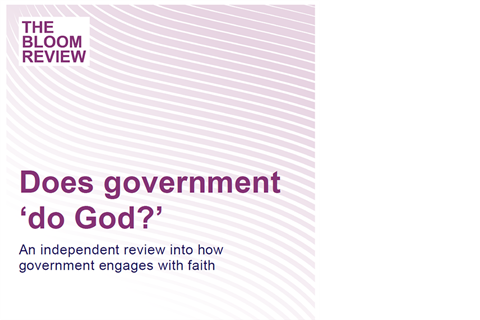Nearly four years in the making, the Bloom Review attempts to answer the question: “Does government ‘do’ God?” The answer is yes, but not always as well as it could, says Danny Webster. If they want to improve, they need to action the findings - and quickly

The Evangelical Alliance has welcomed the findings of the Bloom review, an independent review of the government’s engagement with faith, published this week. But as with all such work, there is always more that could have been included – Bloom said that 30,000 words ended up on the cutting room floor – and there are aspects that require careful interrogation of the detail to understand the implication.
The big question now is: What the government will do with it?
What’s good?
The overall tone of the report encourages the government to improve their engagement with faith groups. That is necessary. In Scotland and Wales, there are standing groups where the government meets regularly with faith groups to discuss policy matters, but no equivalent exists in England. The development of a faith compact for local authorities, if done well, could be a game changer in ensuring faith groups can work effectively in partnership to deliver long term support for local communities.
The impact of Bloom’s report will depend on the recommendations being put into practice
The report also calls for the extension of the special envoy on freedom of religion or belief to consider UK matters as well as international concerns. This is important because it recognises that many who responded to the review – 68 per cent of Christians – thought that their freedom to practice their beliefs was under threat. Likewise, the call for strengthening cross government working with faith groups, through the appointment of an Independent Faith Champion, is a positive move in ensuring the voice of those with faith is heard.
Both of these depend on a broader need - emphasised in public comments by Colin Bloom at the report’s launch - for the staffing of faith engagement within government to be increased. Over the course of the review, the capacity shrunk drastically, and none of the recommendations to improve engagement will be achievable if this is not reversed.
What needs care?
The report recommends the government revisits the registration and regulation of out of school settings. This was tried before, and the Evangelical Alliance and many others criticised the proposed plans for failing to appropriately address the range of settings that could be affected. For example, churches could see Sunday schools regulated and summer camps treated like schools, subject to Ofsted inspections.
In commenting on this, Bloom suggested the government needs to be specific in what it is targeting, and ensure institutions operating just below the threshold for schools do not elude the appropriate safeguards. We will pay close attention to this; a proportionate regime would recognise the sufficiency of regulation that church settings already operate within to ensure that children are safeguarded and premises meet appropriate standards.
Many people of faith feel compromised in living out their beliefs; the report does not address how this could be rectified
Similarly, the report notes that some religious groups, often operating at the fringe of faiths, create high demand environments that can financially exploit vulnerable people. Rightly, there does need to be scrutiny of groups that operate in such a way. Coercion and exploitation should not be allowed simply because it operates under a faith banner. But any fresh regulation needs to identity gaps in the existing law, not simply regulate beliefs people do not like, or practices people disapprove of.
What’s missing?
While the report identifies that many people of faith feel compromised in living out their beliefs, it does not address how this could be rectified. The section on education does not consider the very current challenges many Christians face in education. Orthodox views on sexuality are increasingly being squeezed out, and in sex and relationships education, the space for parents to scrutinise what children are taught - and withdraw them if desired - is inadequate.
The review rightly highlights that religion or belief is often the neglected characteristic from the Equality Act, but does not adequately consider why this might be, apart from proposing better faith literacy training. Specifically, it does not address how the protected characteristics might interact with each other, nor consider how religion or belief could be better protected when this occurs.
What’s next?
The long term impact of Bloom’s report will depend on the government being willing to put into practice many of the recommendations it makes, and provide the resources to do this well. Where there are limitations, there is hope that these can be addressed by better engagement between government and faith groups, as the report calls for.
Where nuance is needed in policy making, good engagement can help policy makers understand concerns. Where policy has the potential for undue interference with freedom of religion or belief, then good relationships between faith leaders and government can help prevent this.
The government responded to the report’s publication by basically saying: “Thanks, we’ll respond at some point”. Which, given that the report has been four years in the making, and according to Bloom was 90 per cent done a year ago but largely held up by the government turbulence of the past year, is a bit underwhelming.
I hope that response won’t take too long.






































No comments yet